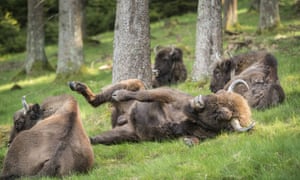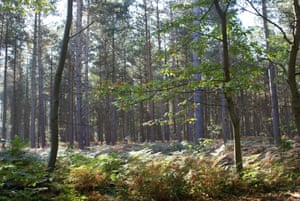Wild bison are to return to the UK for the first time in 6,000 years, with the release of a small herd in Kent planned for spring 2022.
The GBP1m project to reintroduce the animals will help secure the future of an endangered species. But they will also naturally regenerate a former pine wood plantation by killing off trees. This creates a healthy mix of woodland, scrub and glades, boosting insect, bird and plant life.
During the initial release, one male and three females will be set free. Natural breeding will increase the size of the herd, with one calf per year the norm for each female. The bison will come from the Netherlands or Poland, where releases have been successful and safe.
Populations of the UK’s most important wildlife have plummeted by an average of 60% since 1970. Britain is one of the most nature-depleted countries in the world, despite the best efforts of conservationists.
Paul Hadaway, from Kent Wildlife Trust, said: “The Wilder Blean project will prove that a wilder, nature-based solution is the right one to tackle the climate and nature crisis we now face. Using missing keystone species like bison to restore natural processes to habitats is the key to creating bio-abundance in our landscape.”
Bison kill selected trees by eating their bark or rubbing against them to remove their thick winter fur. This creates a feast of dead wood for insects, which provide food for birds. Tree felling also creates sunny clearings where native plants can thrive. The trust expects nightingales and turtle doves to be among the beneficiaries of the bison’s “ecosystem engineering”.
The steppe bison is thought to have roamed the UK until about 6,000 years ago, when hunting and changes in habitat led to its global extinction. The European bison that will be released in Kent is a descendant of this species and its closest living relative.
The European bison is the continent’s largest land mammal and bulls can weigh as much as a tonne. “They’re enormous,” said Stan Smith of Kent Wildlife Trust. “But what is amazing is how they blend into their background and they’re quite docile really.”

The project, funded by the People’s Postcode Lottery Dream Fund, will cover 500 hectares (1,236 acres), with the bison first placed in a 150-hectare area where there are no right-of-way footpaths. This will provide plenty of space for them, even as the herd grows, according to Smith, and normal cattle fencing is sufficient to stop them wandering further afield.
Once the bison are settled, the public will be able to visit the area with rangers and watch the animals from viewing platforms. In the Netherlands, where bison projects have been running for 15 years, people walk through the areas without incident. Free-living longhorn cattle, “iron age” pigs, and Exmoor ponies will also live alongside the bison and assist in restoring the woodland.
“The partners in the Kent project have long dreamed of restoring the true wild woodlands that have been missing from England for too long,” said Paul Whitfield, of Wildwood Trust, the native species conservation charity that will ensure the welfare of the bison. “People will be able to experience nature in a way they haven’t before, connecting them back to the natural world around them in a deeper way.”
The bison will not be given any food or artificial shelters, though their health will be monitored by observing their coats and examining their dung. “We need to keep them as wild as possible [for the project to succeed],” said Smith.

Smith said there was no intention to introduce predators such as wolves. As the herd grows in size, the plan is to move some animals to other sites in the UK. But, he said, “if we absolutely had to, we would cull animals as a last resort”. There are already a small number of European bison in the UK in zoos or wildlife parks, but these are not free-living.
“This initiative could be good news for Britain’s battered biodiversity,” said Rebecca Wrigley, of Rewilding Britain. “It’s increasingly clear that bold and imaginative rewilding is urgently needed to tackle the country’s worrying loss of wildlife.” She said far more needed to be done across the UK to reintroduce large herbivores and “unleash their biodiversity-boosting rewilding magic”.
Smith said: “Sometimes in the rewilding debate people think that it’s a look back to the past, but that’s not what we’re about. We’re about trying to find the right natural solution for the modern world.”